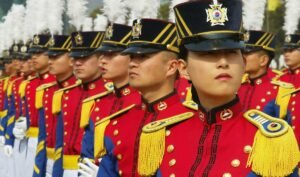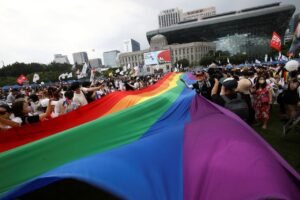
In a recent and contentious verdict rendered on the 27th of October, South Korea’s Constitutional Court issued a ruling upholding a statute that prohibits homosexual relationships within the military ranks. This decision carries extensive ramifications for the LGBTQ+ community in South Korea and underscores the protracted battle for equitable rights within the nation. This article will meticulously scrutinize the intricacies of this ruling, its reverberations, and the broader landscape of LGBTQ+ rights in South Korea.
Contextual Background
South Korea has a long history of endorsing conservative perspectives on LGBTQ+ concerns, and this ruling is an unmistakable manifestation of deeply ingrained values. The statute in question is a component of the Military Criminal Act, explicitly proscribing “anal intercourse” among military personnel. Although this law has been in effect for several years, the challenge to its constitutional validity has now thrust it into the limelight.
Comprehending the Verdict
On the 27th of October, 2023, South Korea’s Constitutional Court delivered a ruling that validated a regulation specifically aimed at same-sex relationships within the military. This statute is embedded within the Military Criminal Act and effectively criminalizes same-sex relationships by outlawing “anal intercourse” among military personnel. The decision, reached by a slender margin through a 5-4 vote, has ignited fervent debates and apprehensions.
The court’s rationale for upholding this ban pivots around the apprehension that endorsing same-sex relationships within the military might potentially undermine discipline and impair combat readiness. While proponents of this law contend that it is imperative for the military’s operational efficiency, opponents regard it as a grave encroachment on human rights and an affront to the LGBTQ+ community.
Impact on the LGBTQ+ Community

This verdict marks a momentous setback for the LGBTQ+ community in South Korea. Even though the nation has made headway in acknowledging LGBTQ+ rights in recent years, such as the decriminalization of consensual same-sex relationships in 2020, the military remains an arduous milieu for LGBTQ+ individuals. Essentially, this ruling compels LGBTQ+ service members to conceal their sexual orientation and endure discrimination within the military’s confines. This determination perpetuates the social stigma and discrimination faced by LGBTQ+ individuals in South Korea, both within the military and society at large.
The ruling is an implicit declaration that same-sex relationships are discordant with military service and, by extension, are perceived as undesired or even unacceptable within Korean society.
The Broader Spectrum of LGBTQ+ Rights
This ruling, which concerns same-sex relationships within the military, is not an isolated event but must be construed within the framework of the ongoing struggle for LGBTQ+ rights in South Korea. While same-sex marriage is not legally recognized in the nation, there have been constructive developments in recent years. The decriminalization of consensual same-sex relationships in 2020 was a momentous stride. South Korea has also borne witness to a burgeoning LGBTQ+ rights movement, characterized by pride parades and advocacy organizations endeavoring to foster equal rights and raise awareness on LGBTQ+ issues.
However, the court’s decision regarding the military ban underscores that there is still considerable work to be accomplished to attain complete parity for the LGBTQ+ community.
International Response
The verdict has not gone unnoticed on the global stage. Human rights organizations and LGBTQ+ advocacy groups from around the world have voiced concerns over this pronouncement. They posit that it not only infringes on the rights of LGBTQ+ individuals but also contravenes the broader international trend of acknowledging and safeguarding LGBTQ+ rights. Countries and organizations that champion LGBTQ+ rights have urged South Korea to reconsider this ban and harmonize its policies with international standards. This ruling may have implications for South Korea’s international image and relationships, as it faces mounting pressure to uphold human rights principles.
The Perpetual Quest for Equality
South Korea’s LGBTQ+ community has been ceaselessly advocating for greater acceptance and legal acknowledgment for years. Despite certain milestones, such as the decriminalization of homosexuality in 2003 and the legalization of same-sex marriage in 2021, societal and institutional challenges endure. This ruling pertaining to the military is emblematic of these persistent struggles.
Influence of Political and Religious Variables
The political landscape in South Korea is molded by conservative and religious influences that have habitually resisted LGBTQ+ rights. The nation’s predominant religious sects, encompassing Christianity and Buddhism, often espouse conservative positions on LGBTQ+ matters. Politicians aligned with these groups have been disinclined to advocate for progressive legislation in this domain.
Public Sentiment
Public sentiment regarding LGBTQ+ rights in South Korea is a mixed bag. While younger generations are progressively more accepting, older generations tend to espouse more conventional viewpoints. This generational divide engenders tension in the nation’s approach to LGBTQ+ rights and legislative initiatives.
Legal Contests The battle over LGBTQ+ rights in South Korea has been a continual one. The legalization of same-sex marriage in 2021, though achieved, was contentious. Moreover, discrimination against LGBTQ+ individuals is not explicitly prohibited by South Korean law, rendering them susceptible to various forms of discrimination in their daily lives.
Conclusion

The ruling issued by South Korea’s Constitutional Court, affirming the prohibition of same-sex relations within the military, has ignited a substantive debate within the nation and elicited international attention. While proponents argue for the necessity of maintaining military discipline, detractors view it as a serious breach of human rights and a setback for the LGBTQ+ community. This verdict underscores the ongoing quest for LGBTQ+ rights in South Korea and underscores the need for persistent advocacy and awareness.
The international community is closely monitoring South Korea’s response to these concerns, as the nation’s stance on LGBTQ+ rights could have ramifications for its global standing. In summation, although South Korea has achieved some measure of progress in recognizing LGBTQ+ rights, the ruling on the military ban serves as a stark reminder that extensive efforts are required to secure complete parity and acceptance for the LGBTQ+ community in the country.










